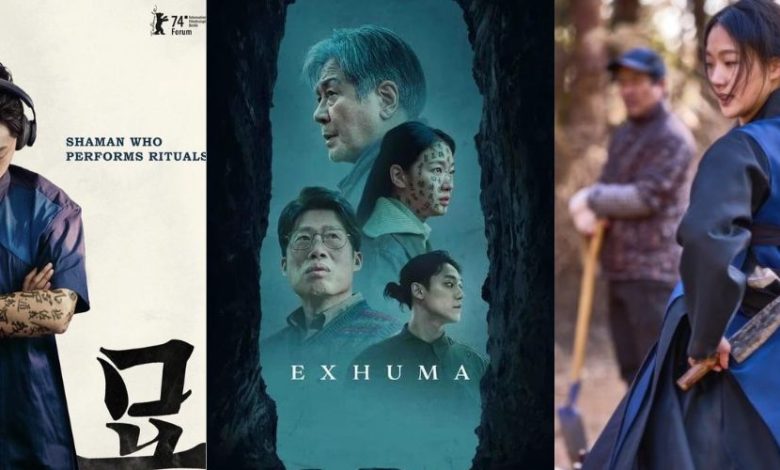South Korean Horror Films: Exhuma and Beyond
Exploring the Evolution and Impact of South Korean Horror Cinema

In regard to world horror films, South Korea is rapidly becoming one of the most significant actors in this genre, combining both the roots of the culture and the features of today’s postmodern world. The recent success of the horror movie “Exhuma” directed by Jang Jae-hyun enshrines the reputation of South Korea in making good horror.

A New Benchmark in Korean Horror: Exhuma
As stated earlier, horror films have been released in the year 2024 that are notable, such as “Exhuma“, which is a groundbreaking film in the history of South Korean cinema. By its director Jang Jae-hyun, “Exhuma” adapts elements of occult stories with current trends in storytelling, giving its audience an eerie feeling as opposed to mere scare tactics involving jumping out of the shadows.
There is some attractive cast, as Kim Go-eun plays Lee Hwa-rim, Lee Do-hyun plays Yoon Bong-gi, and Choi Min-sik plays Kim Sang-deok. A mix of folk, spirit, and psychological horror has become its strong point, and therefore it will take a significant place in this year’s horror.
Premiering in February, “Exhuma” turned into the most popular Korean movie of 2024 with a total collection of $97 million. This success, I believe, shows how the film applies conventional horror tropes but at the same time reinvents the genre. “Exhuma” stands out for its capacity to instill fear based on social and religious concerns as opposed to visually oriented and gratuitous horror.

South Korean Horror Cinema at the Turn of the Twenty-First Century
As has been noted, South Korean horror has long rested on the ability to draw upon the fears shared by global audiences but presented through a cultural lens. In contrast to many western horrors, where a majority of them are simply about startling the audience or things that go bump in the night, or therefore about supernatural forces, South Korean horrors tend to explore more metaphysical dimensions of horror. Such movies as “The Wailing” and “Forgotten” can refer to this trend, where suspense, folklore motifs, and characters’ character progression are used to build the dense and compelling story of the horror.
Another thing to note is that South Korean horror is not heavily dependent on conventional horror themes like haunted houses or spirits. But where these films may fall short is in the portrayal of more complex threats that are related to the anxieties of society, sin, guilt, and spiritual crises. This way, South Korean horror can produce a deeper and longer-lasting effect on its audiences.

The Evolution of Horror Cinema
In this respect, the emergence of the horror cinema in South Korea could be discussed as the reaction to both national and international contexts. Over the years, the horror has shifted in its representations as South Korean filmmakers have begun to amalgamate aspects from the indigenous folklore and religious beliefs towards doing horror. This also helps to improve the density of the storytelling while at the same time successfully widening the potential of the genre by merging culturally specific fears with such fundamental human experiences.
“Exhuma“ succeeded in proving that the future of horror movies is moving from one-dimensional frightened all the way to multi-layered and socially relevant experiences. This change is perhaps due to the shift in nature of body horror as a genre where depth of psychology and emotions seems to have attained priority over the principle of shock.
[ Also Read: The Best Horror Films and Series on Netflix You Can’t Miss ]
Comparing Global Horror Successes
It has to be mentioned that “Exhuma” shows rather impressive results; however, the following reflects the experience in the other regions; recent horror releases have various outcomes. For example, “Immaculate” by Sydney Sweeney was prematurely assessed as a commercial failure even though there were very high expectations towards the show. However, “The First Omen“, a film with similar story plot and concept but a different approach, has been applauded for very good storytelling and a properly placed horror flick.
This disparity shows that the three horror films do not simply speak of production capabilities and the’stars’ brought to bear to make them. However, more often, it depends on the relation of a picture to the viewer and the ability to use the storyline and the themes in the film. Indeed, “Exhuma” is a good example of how seasoning does work by creating something unique and different from the rest of horror movies.

Horror in South Korea: The Future
It is therefore clear from “Exhuma” and other recent films from South Korea that horror films are a healthy and thriving genre. While filmmakers try to innovate and find better ways of combining the eastern traditional and the western contemporary horror, South Korean horror will without a doubt be a force to reckon with in the international film market.
Thus, the adjustability and creativity of the genre while referring to its traditions will guarantee it a constant demand in the course of cultural heritage. To sum up, one could assert that South Korean horror cinema entails significant effects and is in the process of development.
Such works as “Exhuma” not only define the next phases in the horror genre but also indicate what is possible in the realization of a film. As other South Korean directors and screenwriters try even more challenging and diverse topics, the world of horror will for sure benefit from their efforts.




